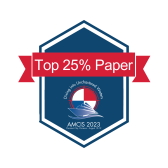Loading...
Paper Type
ERF
Description
As the world moves ever forward into a digital future, the need for responsible digital innovation (RDI) becomes increasingly urgent. This paper presents the access-control-transparency (ACT) theory, a simple yet powerful framework for guiding designers and developers in creating digital artifacts that embody the principles of responsible design. With a focus on promoting access, control, and transparency, this theory aims to address the dark side of digital innovation and ensure that new technologies are developed in a way that considers their impact on individuals, communities, and society. The paper also explores avenues for future research, including the impact of ACT-driven design principles on organizational and societal outcomes, the role of individual and organizational values in the RDI process, and the incorporation of human-centric design and ongoing reflection into the ACT theory.
Paper Number
1611
Recommended Citation
Abhari, Kaveh; Xiao, Bo; and Eisenberg, David, "Responsible Digital Innovation in Dark: Toward Access-Control-Transparency Theory" (2023). AMCIS 2023 Proceedings. 25.
https://aisel.aisnet.org/amcis2023/sig_adit/sig_adit/25
Responsible Digital Innovation in Dark: Toward Access-Control-Transparency Theory
As the world moves ever forward into a digital future, the need for responsible digital innovation (RDI) becomes increasingly urgent. This paper presents the access-control-transparency (ACT) theory, a simple yet powerful framework for guiding designers and developers in creating digital artifacts that embody the principles of responsible design. With a focus on promoting access, control, and transparency, this theory aims to address the dark side of digital innovation and ensure that new technologies are developed in a way that considers their impact on individuals, communities, and society. The paper also explores avenues for future research, including the impact of ACT-driven design principles on organizational and societal outcomes, the role of individual and organizational values in the RDI process, and the incorporation of human-centric design and ongoing reflection into the ACT theory.
When commenting on articles, please be friendly, welcoming, respectful and abide by the AIS eLibrary Discussion Thread Code of Conduct posted here.




Comments
SIG ADIT